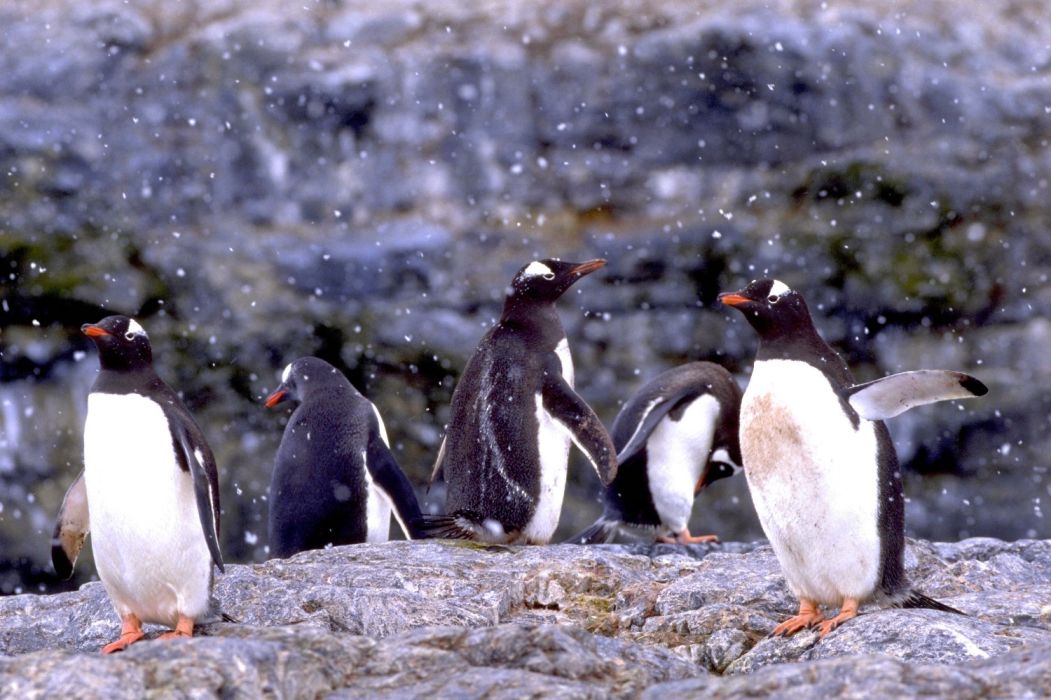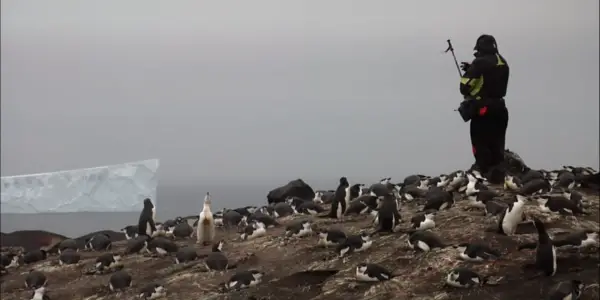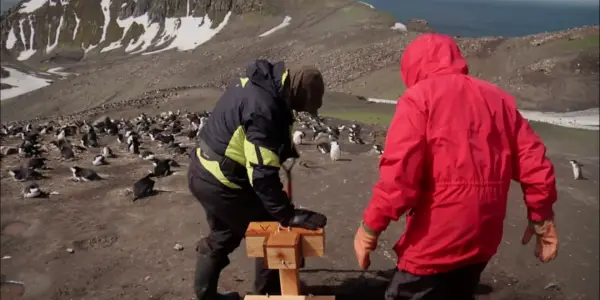THE PENGUIN COUNTERS: A Persnickety Penguin Story

Matthew Roe is a director, writer, producer, film critic, theorist…
As the climate continues to change, scientists around the world have devoted lifetimes to studying its effects on Earth’s wildlife. Ron Naveen, founder of Oceanites, Inc. has spent nearly 30 years studying the dwindling penguin populations of Antarctica, searching for data that can detail what has happened to their numbers and why.
Filmmakers Peter and Harriet Gordon Getzels followed Naveen’s ragtag band of scientists to the cold, harsh waters at the end of the world to document the importance of their work, yet something seems lost in translation. While certainly possessing a sense of wonder and excitement, The Penguin Counters is overly disjointed, scatterbrained, and ultimately feels unfinished.
What Happens?
After a rushed foundation as to why this expedition is taking place, who will be tagging along, and how they are getting there (interlaced with the history of Arctic explorer Sir Ernest Henry Shackleton), Naveen’s team loads down with audio gear and tally counters to manually track various penguin populations at the height of breeding season. Following their journey from Argentina to Deception Island, which lasts nearly half the film’s runtime, the team endures the treacherous and frigid conditions which constantly hinder their efforts.

Each scientist is determined to conclusively prove their hypothesis that penguin populations could hold a significant key to humanity’s survival, all the while logistical nightmares dog their every step. The documentary is casually narrated by Naveen, with clarification and banter by his colleagues filling in the gaps and bolstering each other’s ideas while scrambling to complete their arduous task.
What Works, What Doesn’t, And Why Penguins?
Emmy-nominated composer Robert Neufeld has crafted a delightful and whimsical score that perfectly complements the jovial interaction between the team and their animal subjects, marking the highest point of the work. Pete Penebre‘s sound design is utterly engrossing; blending interview audio with diegetic sound almost seamlessly, which allows for easy immersion into the frozen landscapes via howling wind and gleeful calls of amassing penguins and albatrosses.
Peter Getzels’ and Erik Osterholm’s cinematography does have moments of stunning awe: the tempestuous waters hallmarking the perilous ocean journey, the giant rust-flaked silos collecting frost in abandoned antarctic whaling stations, and the fog-drenched slopes of the volcanic Deception Island littered with the corpses of boiled krill. However, it mostly feels lukewarm and by-the-numbers, with much of the footage contained to the ships the team use as home bases.
Emmy-winning editor Catherine Shields’ final cut has poor rhythm and such an inconsistent focus, I had to struggle to recognize the film’s prime subject. Is it the penguin counters (as the title claims) or is it a general appreciative encompassment of all things antarctic? As it ends, the filmmakers makes it clear that its titular team are indeed the main proponents, but this contradiction throughout contributes to a serious lack of atmosphere and emotional resonance that previous antarctic documents have achieved (March of the Penguins, Encounters at the End of the World), and it does little to distinguish itself from the rest in any particular way.

Numerous details are constantly built up as vastly important before being abandoned completely without any kind of conclusion. The most significant of these is an entire arc of one scientist breaking off from the main group to count penguins on other islands, unceremoniously cut short for more footage of the central team sleeping on their ship.
This burying of the lede is compounded by numerous repetitive scenes of the crew eating meals, expanding little on their camaraderie and failing to prove any particular point through their discussions of each day’s successes and failures, leading to a very frustrating second half (of a very brisk 67-minute film).
While the team of scientists are brimming with enthusiasm and a strong sense of duty about their work, that doesn’t transfer easily to the documentary itself. Though the connection between penguin populations and humanity’s fate is built as the central theme, the team hardly reinforces it beyond simply repeating the hypothesis’ potential whilst counting nests. As the film ends with the team tallying up their final numbers, what is currently being done with this information is never explored, so blind audience acceptance is required to give these findings any weight.
There isn’t much previous data contrasted against the new, and no verification or further experimentation is conducted post-counting to see if estimates indeed are connected to climate change or other contributing factors. That isn’t to say that it isn’t, but with such declarations that penguin numbers are paramount to life on Earth, almost nothing is presented to prove anything either way.
Conclusion: The Penguin Encounters
The whole experience feels as if it were an abbreviated video diary rather than a comprehensive documentary. If this film were the first of a series following Naveen and his team, then this would be a middling commencement at best, but with definite potential to explore its central themes at length. However, as a stand-alone project it runs shallow with its mixed presentation, abrupt tonal shifts, and lackluster conclusion. Though its subject and hypothesis are absolutely crucial in importance, The Penguin Counters does little to prove that import.
Have you seen The Penguin Counters? Tell us you thoughts in the comments below!
The Penguin Counters opened with a Limited Release in the United States on April 21, 2017. For all international release dates, see here.
Does content like this matter to you?
Become a Member and support film journalism. Unlock access to all of Film Inquiry`s great articles. Join a community of like-minded readers who are passionate about cinema - get access to our private members Network, give back to independent filmmakers, and more.
Matthew Roe is a director, writer, producer, film critic, theorist and historian, with over 12 years experience producing film, video, television, and online content. He currently writes DVD/Blu-ray reviews for Under the Radar Magazine, movie reviews for Film Threat, and contributes features to the Anime News Network. He has won two Vollie Television Awards, an Honorable Mention at the LA Movie Awards, and is a Cult Critic Award Finalist. Matthew is a member of the Political Film Society and the Large Association of Movie Blogs.












